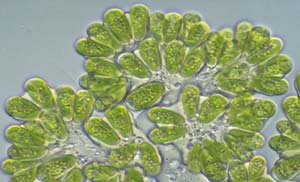Leading candidate of biofuels
Biofuels (biofuels) made from agricultural products (such as cereals, oilseeds .) in the near future may face a ' rival ' formidable competition: microalgae species.
Productivity is 30 times higher
The potential of these algae makes scientists dream. On the same hectare, the microalgae yield is up to 30 times higher than the yield of plants for oil like oilseed rape or sunflower.
Moreover, they grow much faster, almost double after every day. 'Every year, one-and-a-half acres of microalgae in greenhouses can produce tons of microalgae, no matter how bad the weather is good,' said Jean-Paul Braud, director of an algae-growing company. said.
This is a big advantage when it is known that one of the biggest limitations of the production of biofuels from agricultural products is that this requires a very high crop area. 'In order for all cars in France to be run by bioenergy, we must plant oilseed rape on an area equivalent to the area of the whole France' - Mr. Bernard added.
No environmental pollution

(Photo: scieng.flinders.edu.au)
In terms of environment, the impact of these microalgae species is negligible, while the cultivation of oil plants or food crops to make biofuels cannot be used without fertilizers, pesticides .
Microalgae species are nourished by azide, phosphate and carbon dioxide, so people can easily imagine that they are suitable to be cultivated near factories and industrial zones that pollute and use domestic wastewater. or agricultural wastewater .
A program to study the feasibility (study of industrial scale production model) worth 2.6 million euros, in cooperation with many French and international universities and scientific research agencies, is conducted since the end of December 2006.
The primary focus of this program is to find the optimal microalgae with the fastest reproductive capacity and the most productive solution. Now scientists from countries like Germany, China, Spain, America, England and Japan are also racing to find the algae that meet these two conditions .
COMMENT
- Make the first flight with biofuels
- Biofuels: The problem lies in policy
- EP supports the conversion of biofuel use
- Former US presidential candidate boasted to go back in time to 1863?
- Successfully producing the cheapest biofuels in the world
- China: Production of oil-eaten aircraft
- Mexico successfully researched biofuels from spirulina
- Test biofuel from desert plants
- India adopts biofuels policy
- Biofuels can increase pollution 4 times
- Discover potential biofuels
- Biofuels cause controversy over the food crisis
 Why do potatoes have eyes?
Why do potatoes have eyes? 'Tragedy' the world's largest carnivorous life: Death becomes ... public toilet
'Tragedy' the world's largest carnivorous life: Death becomes ... public toilet Tomatoes were once considered 'poisonous' for 200 years
Tomatoes were once considered 'poisonous' for 200 years Detecting microscopic parasites on human face
Detecting microscopic parasites on human face